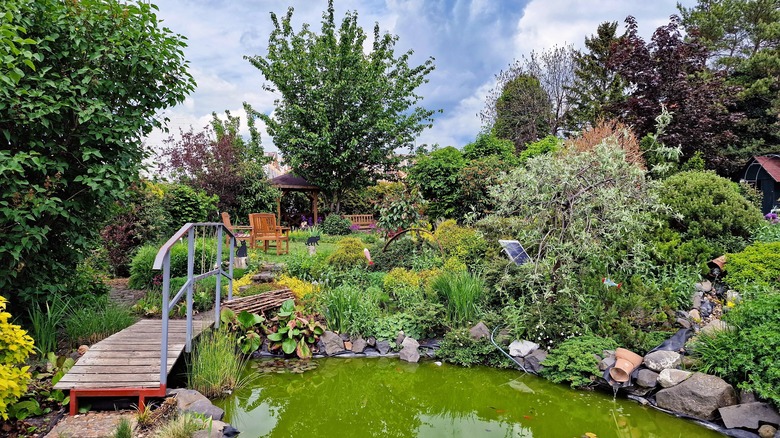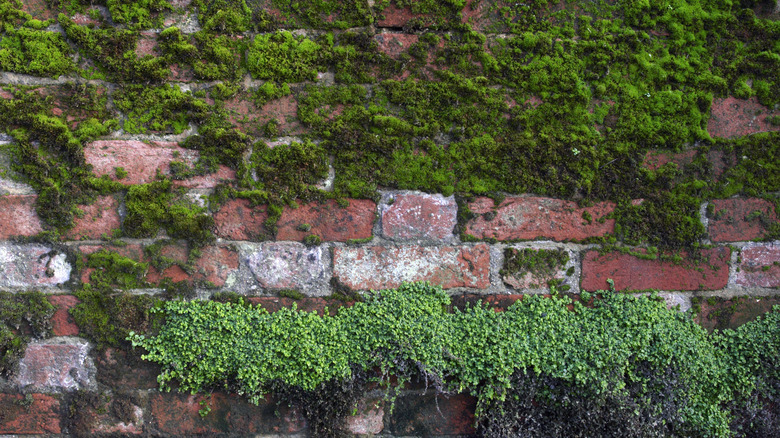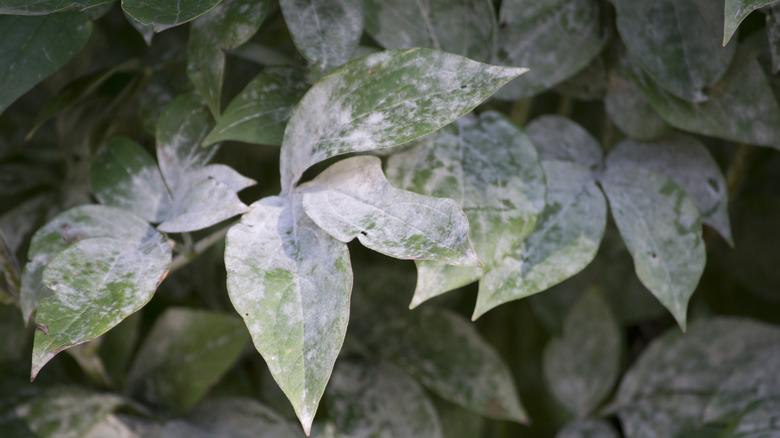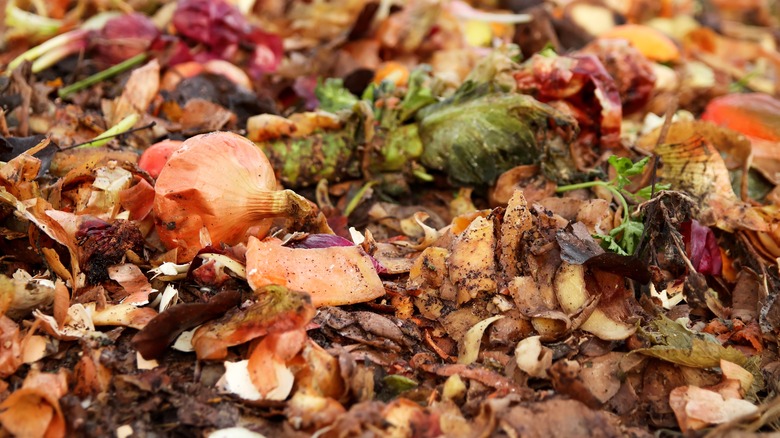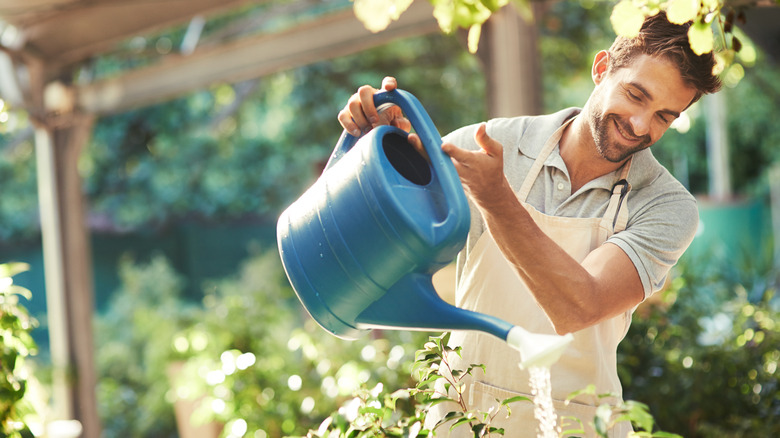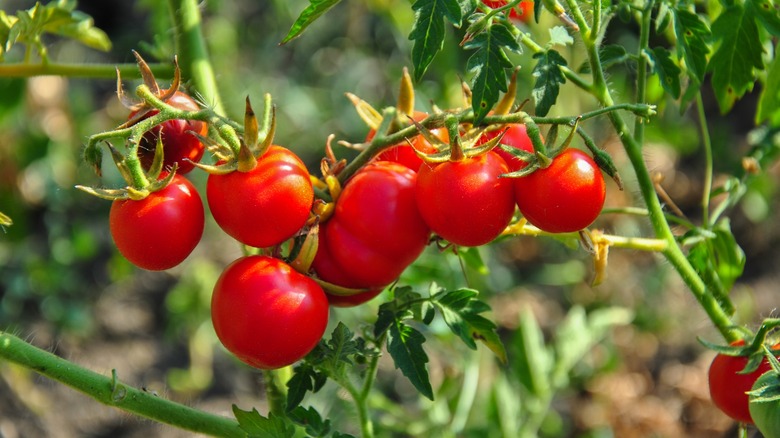The Unlikely Dairy Product That Will Work Wonders In Your Garden
There are many curious tips and tricks when it comes to making the perfect garden, from the benefits of sprinkling red pepper flakes to giving chaos gardening a try. There's even something called lunar phase gardening, where you adjust when and what you plant based on the cycle of the moon. There's no shortage of ways to add a bit of spice to your garden.
Sometimes, it may seem like you need a little of everything to make your plants and yard flourish. However, there is one unlikely dairy product in particular that may help with many of your garden woes. Yogurt is a fermented dairy product, and because of the fermentation process, it is full of bacteria that are beneficial to people and animals. However, the benefits don't stop there; if used correctly, the nutrients and bacteria in this dairy product can also greatly benefit plants. Not only does the bacteria (like Lactobacillus bulgaricus) improve your garden, but the pH of yogurt and the other nutrients it has (such as calcium and nitrogen) can be just what your plant needs to thrive. Here are just a few ways yogurt can help out in the garden.
Make thick moss walls
One benefit of yogurt is that it might be beneficial for growing moss. This is an excellent option for outdoor spaces or on statues or bricks that you want to look older and blend into parts of your garden. It can also be used indoors, but the smell of rotting dairy products isn't always pleasant.
There is some debate on whether yogurt specifically helps moss grow or not. While it does have an ideal pH and nutrients, it's not a magical solution. For one, you need to plant the moss or lichen somewhere it can already grow — you can't take those that grow on trees and expect them to grow on rocks. Additionally, most moss needs moist, shady areas to grow to its best, and yogurt isn't going to enable you to grow it in hot, dry places. However, if you want to give the trick a try, all you need to do is blend fresh moss (about two tablespoons) with a cup of plain yogurt and paint it on the surface of your choice.
Kill off bad fungi
Yogurt is tremendous for killing off harmful molds and mildew that are potentially harming your plants. Powdery mildew, black spots, and rust are just some examples of dangerous fungal diseases that can be incredibly detrimental to your garden. Thankfully, a little bit of yogurt can help.
This dairy product has antifungal properties due to the bacteria it produces. This bacteria can break down cell walls of fungi and release compounds toxic to them without harming the plant. This means it's relatively safe for you to use in your garden without worry.
All you need is a tablespoon or so of yogurt and a cup of water. As you want to directly apply this mixture to the mildew or other fungi causing the problems, it's best to mix it and pour it into a spray bottle before spraying the leaves generously. You'll want to hit all the leaves and not just the ones with visible signs, as some spores are impossible to see with the naked eye and may have spread to other leaves. This mixture can be used roughly once a week.
Speed up compost
Yogurt is a fabulous addition to compost piles, as both homemade and store-bought yogurts contain lactic acid bacteria. Even some flavored options can be tossed in — if they're not eaten in time. This beneficial bacteria helps keep away more harmful bacteria and promotes the growth of other helpful microorganisms.
Of course, there are certain times you want to avoid putting dairy products like yogurt into your compost. If you have an open compost pile, you may want to keep out any dairy, as it can attract pests thanks to its smell and low decomposition rate. Yogurt often stinks as it breaks down, especially if your compost pile doesn't have a solid layer of broken-down materials. These are just some of the reasons dairy is sometimes recommended as one of those things you should never put in your compost bin. However, if you have a closed or covered pile, yogurt might be just what you need.
You don't need to go out and buy tubs of yogurt. In fact, you want to avoid adding too much, as it can cause an imbalance in microorganisms. However, anytime you have some yogurt that is starting to go bad, don't be afraid to dump it in your compost pile.
Provide plants with a boost
Yogurt has many benefits for your indoor and outdoor plants. For example, mixing equal parts water and yogurt creates a fabulous fertilizer for any plant. Organic Greek yogurt works best, but any plain variety is fine. The mixture is packed with nitrogen and phosphorus, which many plants need. The best part is that it does the business without you having to rely on fertilizers with harmful artificial additives like those you'd find at a store.
There is another benefit to including some yogurt as a fertilizer. It can improve a plant's ability to absorb nutrients, especially nitrogen. For best absorption, pour the mixture directly onto the soil. This is a great trick for your garden, and it also works with indoor plants.
Like most other things in life, using yogurt as a fertilizer should be applied in moderation. You likely only need to add it to your plants once a month. If you are growing vegetation that enjoys a lot of nitrogen, you may be able to up the frequency to twice a month. Just be careful you aren't over-fertilizing by mixing several tips and tricks, such as taking banana peels and using them in your garden, as some plants might do just as bad with too many nutrients as too little.
Improve the soil
In addition to being a good fertilizer, yogurt has other nutritional benefits for gardens. For example, while all plants need calcium, some grow best with a little extra. Apples, tomatoes, peanuts, cotton, melons, cherries, and citrus are just a few examples of plants that grow well with a boost of calcium. However, using yogurt with tomatoes is a balancing act, as the excess nitrogen can be why your tomato plants are hollow inside.
While any dairy product provides calcium, yogurt has additional benefits over standard milk. Some reports suggest that the higher acidity yogurt brings to the soil can help hydrangeas turn a deep blue color. While there are other additions and chemicals you can add to the soil to change the colors of the flowers, yogurt is a rather cheap and more natural option.
There are also plants that love acidity in their soil. If you're trying to grow a couple of these plants — like azaleas, blueberries, beans, squash, thyme, and rhododendrons — a little yogurt mixed in the soil before planting can go a long way. If you've already put down your seeds, you can also dilute the yogurt and pour it into the soil as you would when using this dairy product as a fertilizer.
